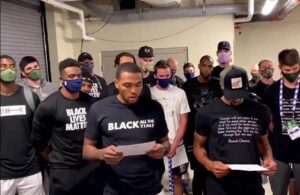
“When all you have is a hammer, everything looks like a nail.”
This saying came to mind the other day, when I heard that Donald Trump criticized players in the NBA for postponing playoff games in the wake of the shooting of Jacob Blake by saying that the NBA had become a “political organization.” Or perhaps the saying would relate more precisely to the president’s mentality if it was: “When all you have is a hammer, all you think everybody else has is a hammer too.” Based on his words and actions, the president appears to view everything in recent months in relation to his own holding onto political power. He doesn’t seem capable of transcending his own self-interest to have empathy for people who have suffered or died, for example, from the coronavirus or excessive use of force by police against African Americans. And so, for him, the players and teams and even leagues that postponed play due to the shooting of Jacob Blake must be motivated by quest for power in a political sense as well.
“When all you have is a hammer …”
But sport is a part of civil society. It has its own internal goods and intrinsic rewards. Basketball is the same game on the playgrounds of Detroit as it is at the highest levels of the NBA. And the players who excel at the highest levels do so because they came to love the game when they were young. They and their coaches are the ones who understand the internal goods of their sport. It is true that basketball at the level of the NBA is connected to external goods such as money and fame. And these can corrupt the sport if they start to take center stage. External actors, such as politicians, can also corrupt sports by attempting to use them for their own agenda. It is important for sport to maintain a certain autonomy from such intrusion. This requires virtues, such as courage, on the part of players and coaches and league administrators to protect the internal goods of the sport.
One of the internal goods of a team sport like basketball is teamwork. Teams are most successful — and most enjoyable to watch — when players are playing together and unselfishly. This kind of teamwork happens when there is trust among the players. It is not uncommon for players and coaches to speak of this in terms of love for one another. When University of Michigan quarterback phenom Denard Robinson addressed the underclassmen at the end of his last game in 2012, for example, he said: “I just wanted to tell them that the seniors love them. I wanted to tell them that we love them — and after this year, just keep growing closer. The senior class — we tried to make them grow closer and keep growing closer and hopefully they take that and run with it.”
Because many young people enjoy playing sports, it can be particularly effective in communicating values. According to pope emeritus Benedict, the attraction of sport at its most fundamental level is that it is a kind of play, an expression of freedom. For the former pope, when we freely take seriously something that is not necessary or related to the serious concerns of life, we can overcome the “slavish earnestness of daily life” and even experience a “foretaste of Paradise”. But the other side of sport is that it is a “training for life.” The fascination of sport, he says, lies in the fact that it “unites both aspects in a very persuasive manner.” In team play, for example, the player “learns to put his individuality in the service of the whole. Sport unites people in a common goal: the success and failure of each one lies in the success or failure of everyone.”*
A more adequate way than the president’s to understand the recent postponement of games by teams and leagues as well as earlier athlete protests is that they are motivated by ethical concerns. They are an expression of a commitment to the common good, the social conditions that create the possibility for all people to realize their full humanity. This concern for the common good is an outgrowth of the internal good of teamwork in sport and the players on the Milwaukee Bucks, for example, have clearly become well-schooled in it in their youth.
None of the players who were involved in earlier protests or the recent postponements are running for political office, as far as I know. And, in fact, in some cases their careers have been harmed irreparably because of their actions. The Milwaukee Bucks were one of the favorites to win the NBA championship this year. They were willing to put this pursuit, which they surely have dreamt of all their lives, on hold. This is because they were able to see that there was something more important than winning an NBA Championship and the money and fame that would surely follow.
We are living in precarious times. When we give too much importance to money, fame and power and view our activities only instrumentally as a way of procuring these, we lose the capacity to recognize the internal goods and intrinsic rewards of much of what we are doing in our daily lives. When it comes to sport, we then run the risk of not being able to see its broader human and societal significance, which the courageous young men on the Milwaukee Bucks and other athletes, teams and leagues are trying to teach us at the moment.
*These words are from an interview given by then Cardinal Josef Ratzinger in June, 1978. He is responding to a question about why there is so much interest on a global scale in the soccer World Cup that was to be held that year.